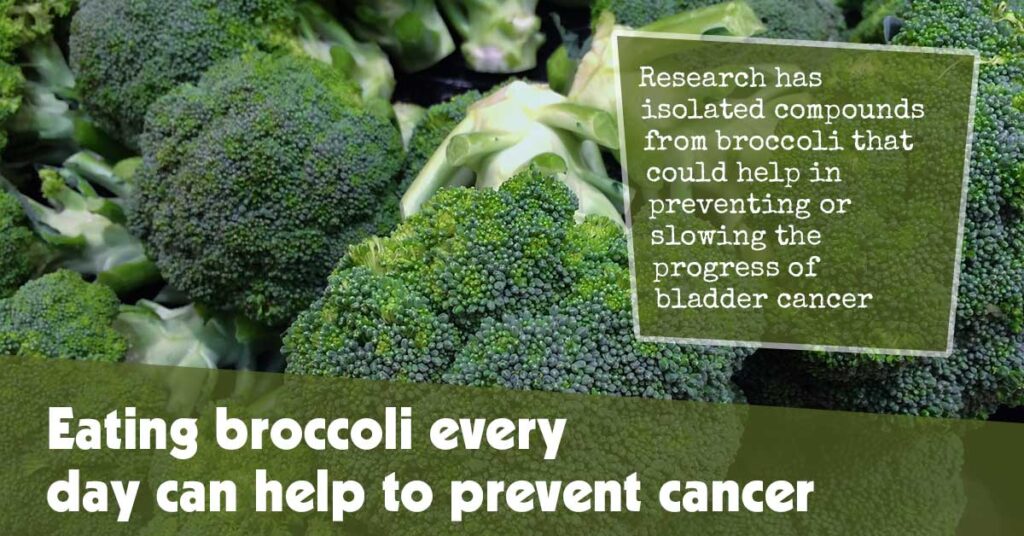Studies on broccoli have identified compounds that could aid in the prevention and progression of bladder cancer. One such study revealed that men who consumed two or more half-cup servings per week experienced 44% reduced incidence compared to men who consumed less than one helping each week.
Broccoli sprouts contain compounds known as glucosinolates that, when chewed or chopped and digested, transform into the nutritional powerhouses known as isothiocyanates that may help fight cancer.
Laboratory experiments demonstrated that isothiocyanates could significantly inhibit bladder cancer cell growth; their effect was most dramatic with respect to those strains most prevalent of bladder cancer.
First, glucosinolate levels from broccoli sprouts were extracted and measured. A process was then undertaken that utilized enzymes to convert these glucosinolates to isothiocyanates; although young sprouts naturally contain higher concentrations of phytochemicals than fully matured broccoli spears, consumption of both can provide health benefits.
Researchers experimented with treating one mouse cell line and two human bladder cancer cell lines with various amounts of isothiocyanates and glucosinolates; although glucosinolates convert to isothiocyanates over time, they wanted to see if there would be any impactful effect in controlling cancer cell growth from glucosinolates alone.
Though glucosinolates had no discernable impact, isothiocyanates successfully reduced cell growth across all 3 cell lines; particularly effective against human invasive transitional cell carcinoma which was the most aggressive of these.
Studies Show Combining Broccoli and Tomato for Prostate Cancer
Another research study has demonstrated that eating together broccoli and tomatoes, two known cancer fighters, can more efficiently shrink prostate tumors compared to individually consumed.
Broccoli and tomatoes may produce an additive effect when taken together, which is believed to be due to different bioactive compounds present in each veggie that act on distinct anti-cancer pathways.
Lab rats with implanted prostate cancer cells were fed a diet comprising 10% broccoli powder and 10% tomato powder as whole foods powders; their effects are comparable to taking individual parts as supplements.
Lab rats that had not been castrated received either broccoli or tomato powder alone; or either lycopene supplements from tomato red pigment lycopene as considered effective at fighting cancer; or finasteride medication used to treat enlarged prostates. Furthermore, another group were castrated.
The broccoli/tomato combo diet proved more successful than all other treatments for shrinking prostate tumors in rats than any other diet, according to tumor biopsies conducted during studies, which confirmed that tumor cells weren’t growing as rapidly in these animals fed the broccoli/tomato diet combination. Castration was the only other approach capable of matching its effectiveness.
Men should consume 1.4 cups of raw broccoli per day and 2.5 cups of fresh tomato per day to experience these effects, or 1/2 cup of tomato paste or one cup of tomato sauce; cooked tomatoes may provide added benefits over raw ones compared with their raw counterparts, increasing bioavailability of cancer-fighting compounds that were enhanced through cutting and heating processes.
Broccoli could help smokers reduce lung cancer risk, according to another study. Broccoli’s cancer-fighting properties appear particularly effective against lung cancer among smokers.
Cruciferous vegetables such as broccoli have long been proven to protect against cancer; this comprehensive study demonstrated a protective benefit specifically for smokers – particularly former ones. People who stop smoking will gain even more from the consumption of cruciferous vegetables.
Researchers conducted a case-controlled study involving hospitalized lung cancer cases and smoking status-matched controls, including all commonly eaten cruciferous vegetables that are raw versus cooked; statistical calculations were performed to account for smoking status, intensity and duration.
Consumption of cruciferous vegetables was associated with anywhere between 20% to 55% risk reduction for smokers depending on the kind of vegetable consumed as well as intensity and duration of smoking.
As one example, consumption of raw cruciferous vegetables was found to reduce lung cancer risk for current smokers; no significant correlations were noted for consumption of vegetables generally or fruits.
Compounds found in broccoli could help protect against colon cancer Brassica vegetables like broccoli contain compounds which may assist with maintaining a healthy gut environment and protecting from cancer of the colon, according to one study. Mice fed an indole-3-carbinol-rich diet consisting of broccoli and other Brassica vegetables were protected from inflammation of their gut and cancerous growths of their colons.
Though the health benefits of vegetables are well-documented, their exact mechanisms remain obscure. This study provides evidence of how indole-3-carbinol intake in diet can assist in preventing inflammation and cancer of the colon by activating an important protein known as an Aryl Hydrocarbon Receptor.
The Aryl Hydrocarbon Receptor serves as a protective environmental sensor by relaying signals between epithelial cells and immune cells in the gut lining and its inhabitants – to avoid inflammation caused by gut bacteria.
Genetically modified mice that don’t produce or activate an aryl hydrocarbon receptor in their gut were studied, and it was observed that they quickly developed inflammation which progressed to colon cancer. When fed an indole-3-carbinol-enriched diet instead, however, neither inflammation nor cancer occurred as quickly. Mice with already developing cancer were switched over to this diet and ended up with significantly fewer tumors that were more benign.
Studies conducted on mice and their gut organoids (intestinal stem cells), revealed that the Aryl Hydrocarbon Receptor is essential to the repair of damaged epithelial cells. Without it, intestinal stem cells would not be able to differentiate into specialized nutrient-absorbing epithelial cells or produce protective mucus; rather they would divide uncontrollably leading to colon cancer.




